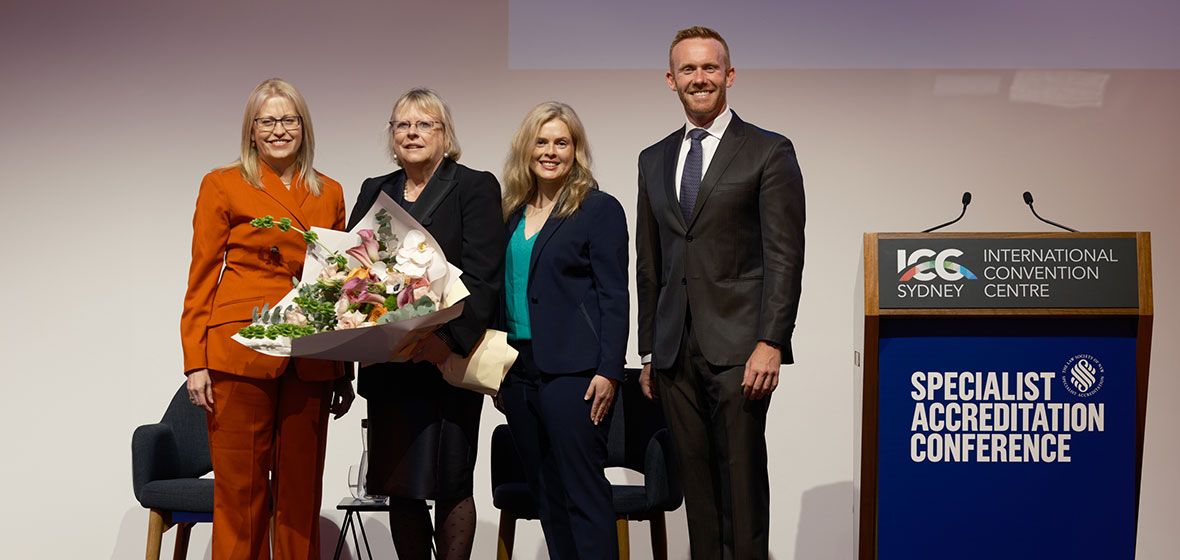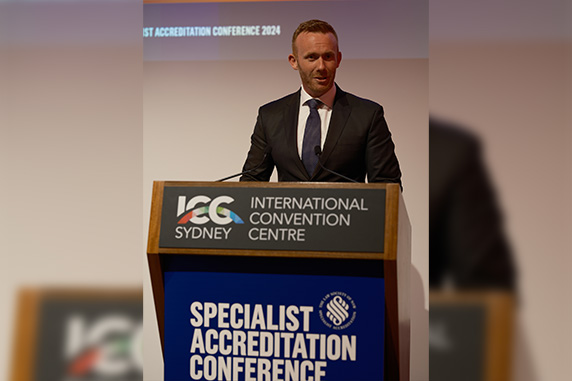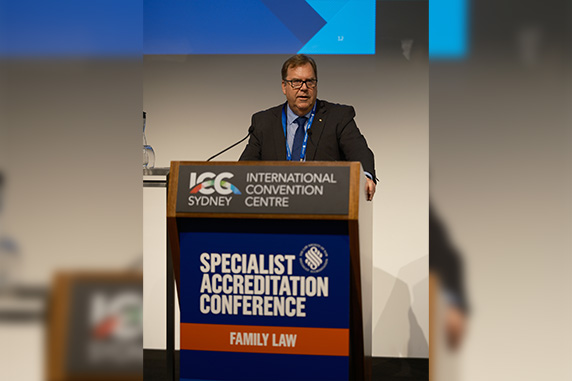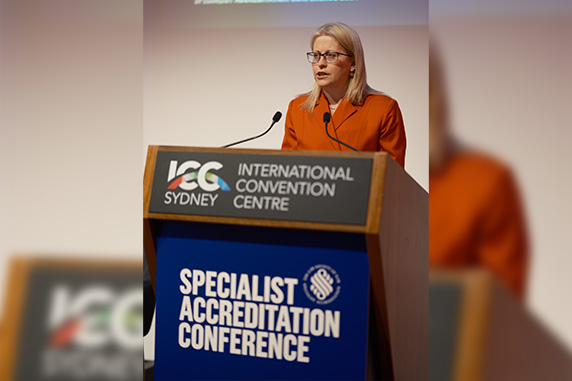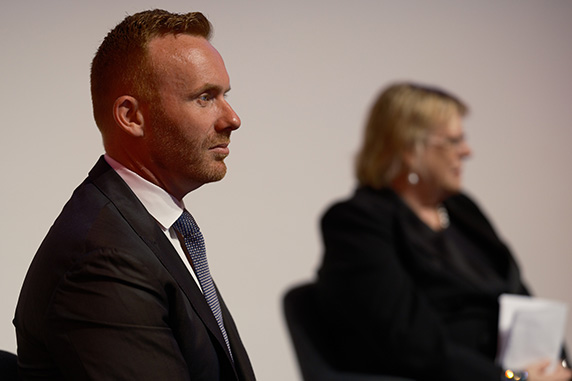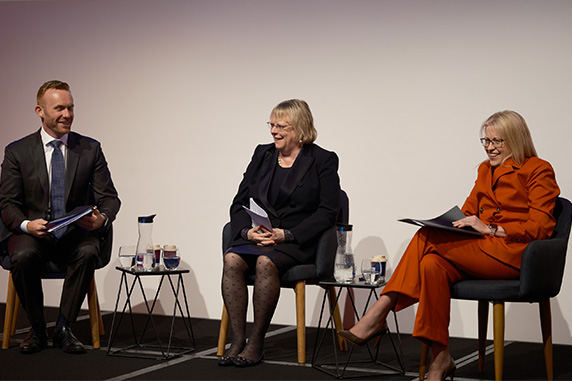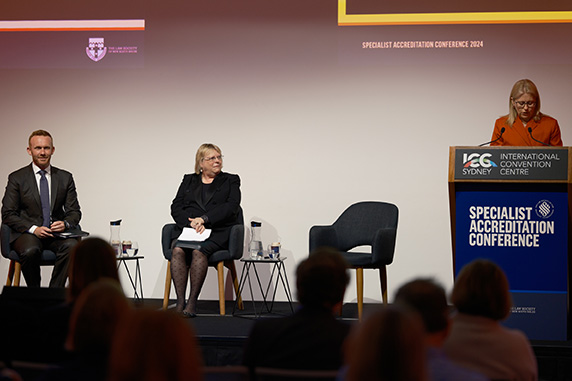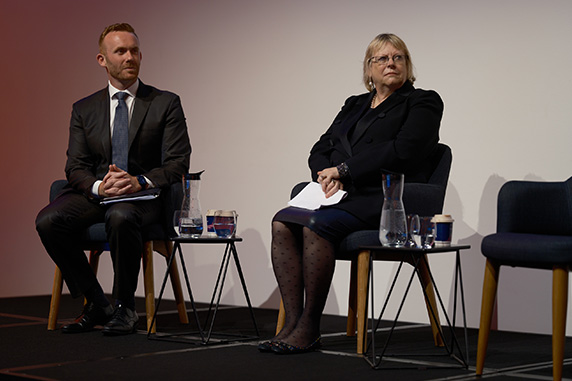Last Thursday, despite a wet start to the morning, close to 300 members of the legal profession gathered at the International Convention Centre (ICC) in Sydney to attend the first day of the annual Specialist Accreditation Conference.
The conference offered streams that covered a variety of areas including personal injury, business law, family law, wills and estates, and property law. On Friday, attendees met virtually for a half-day of online sessions.
While day one was filled with valuable insights and engaging discussions for attendees, it also marked a historic day for the profession.
Specialist Accreditation has been a part of the NSW legal landscape since 1992 with the establishment of the first Specialist Accreditation Board. This scheme was created to recognise advanced expertise in discrete areas of law with the first assessments delivered in 1993.
Jacqueline Dawson, Chair of the Specialist Accreditation Board, opened the conference with the announcement of a groundbreaking new Elder Law program, the first new area of law to join the Specialist Accreditation scheme since 2009.
Dawson stated that Australia’s rapidly ageing population will see the number of over-65s doubling in 40 years. This surge coincides with rising elder abuse cases and increased demand for guardianship services. But while the number of Elder Law lawyers is growing, it’s not keeping pace with the escalating need.
Brett McGrath, President of the Law Society of NSW, said that Specialist Accreditation is vital to the legal profession and “sends a clear message to people who rely on our services, that we are not just trusted legal advisors and advocates, but outstanding in our field.”
“Since the early 1990s it has sent a clear message that we provide the highest level of independent legal advice from solicitors within NSW,” McGrath said.
“And now with the launch of the Elder Law Specialist Accreditation, it sends a clear message that we support people at all stages of their life.”
Justice Julie Ward delivered the keynote address where she stated that “public confidence in the administration of justice is important to the maintenance of the rule of law, one of the most important pillars of a peaceful and democratic society.”
She reiterated that legal practitioners play an important role in ensuring that trust in the law is maintained as solicitors are often the “first real encounter with the legal system for the ordinary citizen…”
Her Honour referred to a recent poll showing low levels of public confidence in the law and the legal system. She said that it is important, as members of the legal profession and representatives of the legal system, to “take steps to rebuild trust in the law.”
Personal Injury Law
The stream delved into a range of critical topics affecting the profession. Key areas explored included the complexities of total permanent disability claims, the impact of psychological and psychiatric workplace injuries, and the legal process of challenging Personal Injury Commission decisions. The conference also provided insights into the evolving issue of historical child sexual abuse claims and analysed recent medical negligence cases to identify emerging trends and best practices.
Business Law
The Business Law stream focused on providing practical guidance on navigating the complex legal landscape for businesses. Topics covered included the implementation of new legislation, recent developments in competition and consumer law, strategies for resolving commercial disputes, and protecting businesses from cyber threats. Additionally, the stream delved into tax implications of employee share schemes and essential considerations for business succession planning.
Malcolm Heath, Practice Risk Manager for Lawcover, gave a presentation on Cyber shields for business in a time of data insecurity. This focused on the significant impact of cybercrime on businesses, particularly law firms, and the strategies and responses needed to address these threats.
Heath pointed out that the hackers behind cyber-attacks don’t have specific targets, instead looking for vulnerabilities in systems. He stressed that it was important for law firms to reassess their IT security, including their relationships with IT providers, and implementing robust cybersecurity measures to mitigate their impact.
“I think it’s now time to do an appropriate due diligence with our IT providers, so we’ve got a higher level of confidence in terms of their skill sets, their accreditation, their abilities, and also their recruiting,” Heath said.
And while this comes at a cost, Heath said “I look at the other side of that coin, and I don’t say there’s a spend, I look at it as an investment as to the efficiencies that can be gained in these areas.”
Family Law
The Honourable Deputy Chief Justice Robert McClelland AO opened the family law stream with an informative discussion of the reforms that the Court has introduced to deal with family violence. “It is a matter that is taken with the utmost seriousness of the Court. … the Prime Minister has described it as a national crisis. The permanent Chief Justice has labelled it a national disgrace. In truth, it is both of those things. The statistics speak for themselves,” he said.
His Honour discussed the reforms that the Court has implemented to improve the safety and efficiency in dealing with family violence cases.
Healso reinforced the importance of lawyers maintaining the skills and the services that lawyers provide. His Honour praised the impact that skilled family law practitioners have, their capacity to assist not only the client that they represent but to also make a “positive contribution to the lives of children and dynamics of the extended families and safety in the community.”
Other family law sessions on day one featured a discussion of “Complex family law financial disputes” presented by the Honourable Justice Peter Campton, a look at the 2023 parenting reforms, coercive control as a criminal offence, trauma-informed practice and how to protect clients and solicitors in high conflict disputes, busting the trust, and a panel discussion on the “redefinition of family member” under the Family Law Act 1975.
Wills and Estates
Raoul Wilson SC, kicked off the wills and estates stream on day one of the conference with a discussion on “Inter vivos and testamentary trusts in estate planning and administration.” Wilson examined recent and notable decisions in this area including Camilleri v Alexakis [2024] NSWCA 118 and the Court of Appeal’s decision in Lewis v Lewis [2021] NSWCA 168.
This was followed by sessions examining complicated estate administration issues, complex family provision matters in blended families, a panel discussion on the effective of cognitive impairment on testamentary decision-making capacity, complex probate applications and more.
Property Law
The property law stream on day one of the conference featured discussions on renewables and environmental considerations in property transactions, native title, combustible cladding, unfairness in property transactions under both statute and common law and a panel discussion on updates in strata law and practice.
The panel discussed the role of strata managers and whether they are fiduciaries, conflict and profit rulesandidentifying the boundaries between individual lots and common property.

